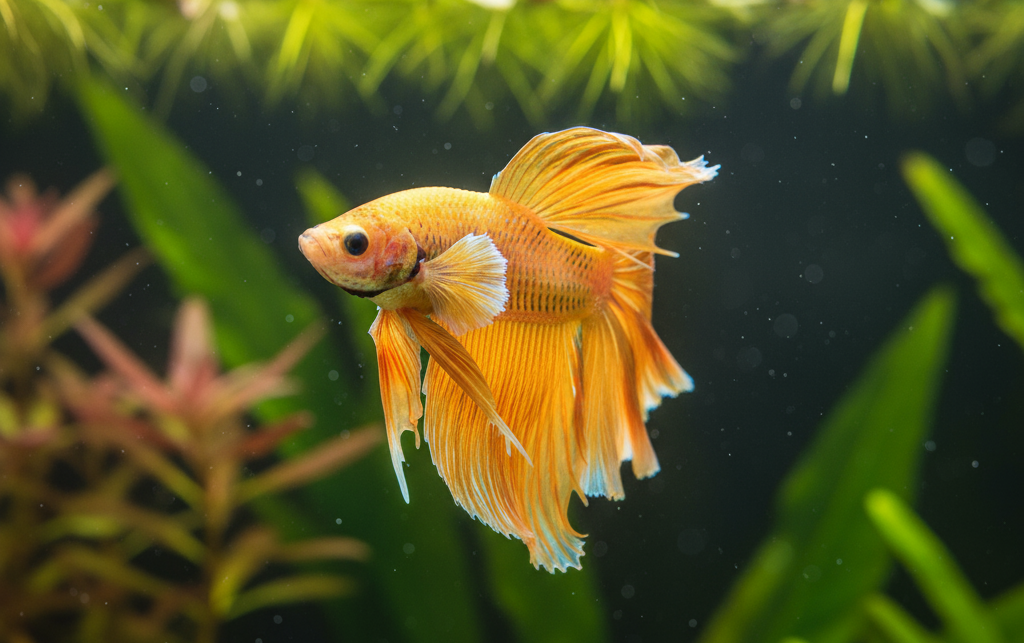A lot of new fish owners want to know how long a betta fish can go without food. Your betta’s health needs to know how much they can eat, whether you’re going away for a few days, or they just won’t eat.
Betta fish are tough and can adapt, but that doesn’t mean they can go without food for a long time. This guide will tell you exactly how long a betta fish can go without food, what affects that time, how to get your pet ready for short fasts, and how to keep your fish healthy even when you’re not home.
Before you can figure out how long a betta fish can go without food, you need to know what it eats in the wild.
Betta fish live in shallow waters like rice paddies and slow moving streams in the wild. They eat small crustaceans, insects, and larvae. This natural diet is high in protein and only happens when food is available.
Because of this way of eating, bettas can go without food for short periods of time. But knowing how long a betta fish can go without food can help you avoid accidentally starving it and keep it healthy and full of energy, even when meals are late.
How long can a betta fish safely go without food?
A healthy adult betta fish can usually go without food for 7 to 10 days, but that doesn’t mean it’s safe or good for them. Bettas start using stored fat and muscle for energy after 3 to 4 days. This can make their immune system weaker.
For the best care, don’t leave your betta without food for more than three to five days on purpose. Your fish could also get stressed, tired, and hurt their organs if they go too long without food. It tells you how long a betta fish can go without food, but it’s always better to avoid fasting when you can.
Tank temperature is one thing that can affect how long a betta fish can go without food.
The temperature of the tank is very important for metabolism. A betta’s metabolism speeds up when the water is warm (about 78–80°F or 25–27°C), which makes it use energy faster. When the temperature drops, metabolism slows down, which means that a betta fish can go a little longer without food.
But keeping the water too cold can be bad for your health, so it’s important to keep the temperature stable and warm.
Age and Health
Young and weak bettas can’t go without food for as long as healthy adults can. Young bettas need to be fed often to grow, but older bettas may not have as much energy stored up. So, how long a betta fish can go without food depends a lot on how healthy it is.
Quality of Water
A strong immune system and less stress come from drinking clean water. On the other hand, bad water conditions make it harder for your fish to fast. Your betta will be better able to handle short periods of fasting safely if you change the water regularly and filter it properly.
Eating habits and nutrition
Bettas that eat a balanced diet with lots of nutrients are usually healthier and can handle short periods of fasting better. People who eat too much or eat bad food may have digestive problems or weakness more quickly.
What Happens to a Betta Fish When It Doesn’t Eat
It’s also important to know what happens when a betta fish doesn’t eat, after you know how long it can go without food.
For the first few days, your betta may act normally, using energy it has stored up. Energy levels drop, activity decreases, and your fish may become lethargic or less responsive after 3 to 5 days.
After a week, you can see signs like faded colour, clamped fins, and weight loss. At this point, your betta is really stressed out. If you don’t eat for more than ten days, you could die or be hurt for life. So, you should never see how long your betta can go without food.
Getting Your Betta Fish Ready for Short Times Without Food
There are times when you have to travel or deal with an emergency. If you have to leave your betta alone, you need to get ready.
Please give them a healthy diet before you go.
Give your betta high-quality pellets or frozen food that is high in protein a few days before you leave. This helps your fish store energy and stay full for longer.
Make the aquarium clean.
It’s very important to keep things clean when you won’t be feeding your betta for a few days. Before you leave, do a partial water change, clean the filter, and check the temperature. Good water conditions lower stress and help your fish stay strong.
Get an automatic feeder or ask someone to help you.
If you’ll be gone for more than three or four days, buy an automatic feeder that gives out small amounts of food every day. You could also ask a friend or neighbour you trust to feed your betta in measured amounts so that it doesn’t eat too much.
People often think that a betta fish can go without food for a long time.
There are a lot of wrong ideas about how to feed bettas. Many people think that bettas can live for weeks without food, but this is not true. They might live for a while, but they will be hurt physically and emotionally.
Some people believe that bettas can eat plants or algae in the tank when you’re not there. Bettas eat meat, not plants. They need animal protein to live and can’t live on plants alone.
Knowing these myths will help you decide how long a betta fish can go without food and what to do when you’re not there.
How to tell if your Betta fish is hungry or not getting enough food?
If you know the signs of hunger, you can avoid fasting without meaning to. When a betta is hungry, it will swim near the surface and wait for food or chase after small things that float. If your fish won’t eat for a few meals, it could be because it’s sick, stressed, or the water quality is bad, not because it can’t fast.
If a betta isn’t getting enough food, it will look thin, pale, and not move. These signs mean that your fish hasn’t eaten in a long time, so you need to change when you feed it right away.
How to Give a Betta Fish Food After It Has Been Fasting
Please don’t give your betta too much food when you get home or start feeding it again. Start with small amounts of pellets or frozen food and work your way up. If you eat too much after fasting, you could get bloated and have stomach problems.
Give your fish two meals a day, each with small pieces that they can eat in two minutes. Slowly get back into your normal routine while keeping the tank clean and the water temperature stable. This helps your betta get better and stronger quickly.
FAQS
Q1: How long can a betta fish safely go without eating?
A healthy betta can go without food for about 7 to 10 days, but it’s best to limit fasting to no more than 4 to 5 days.
Q2: Is it okay to leave my betta fish alone for a week without food?
If the tank is clean and the conditions are stable, you can leave your betta for a week. However, it is safer to use an automatic feeder or helper.
Q3: What do I do if my betta hasn’t eaten in days?
Check the quality and temperature of the water. If the weather is good, try giving them different high-protein foods like pellets or brine shrimp.
Q4: Is it good for my betta fish not to eat?
A short fast once a week can help with digestion, but you shouldn’t fast for a long time.
Q5: Do bettas eat plants when they’re hungry?
No. Bettas are carnivores, which means they need food that is high in protein, not plants or algae.
In conclusion
Now you know exactly how long a betta fish can go without food and how to keep them safe while they are fasting for short periods of time. Bettas can go a week without eating, but it’s always best to plan to keep them healthy and stress-free.
Please give them a diet that is high in protein and good quality, keep their water clean, and make sure they have reliable ways to eat when you’re not around. Your betta fish will stay bright, active, and healthy for years to come if you take good care of it.


